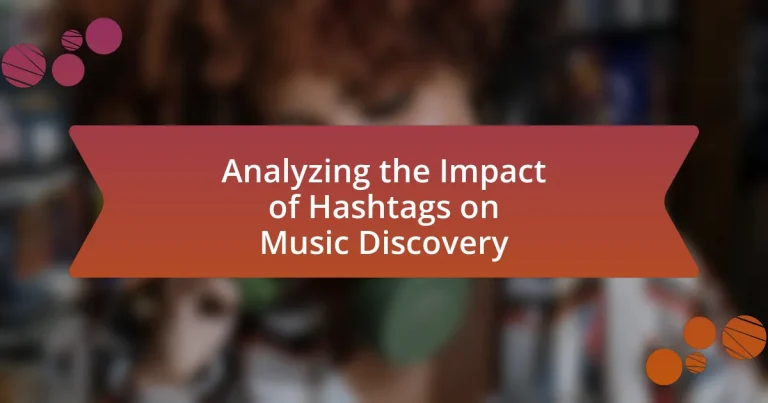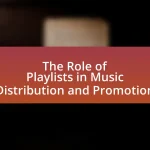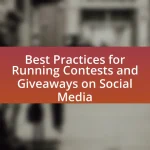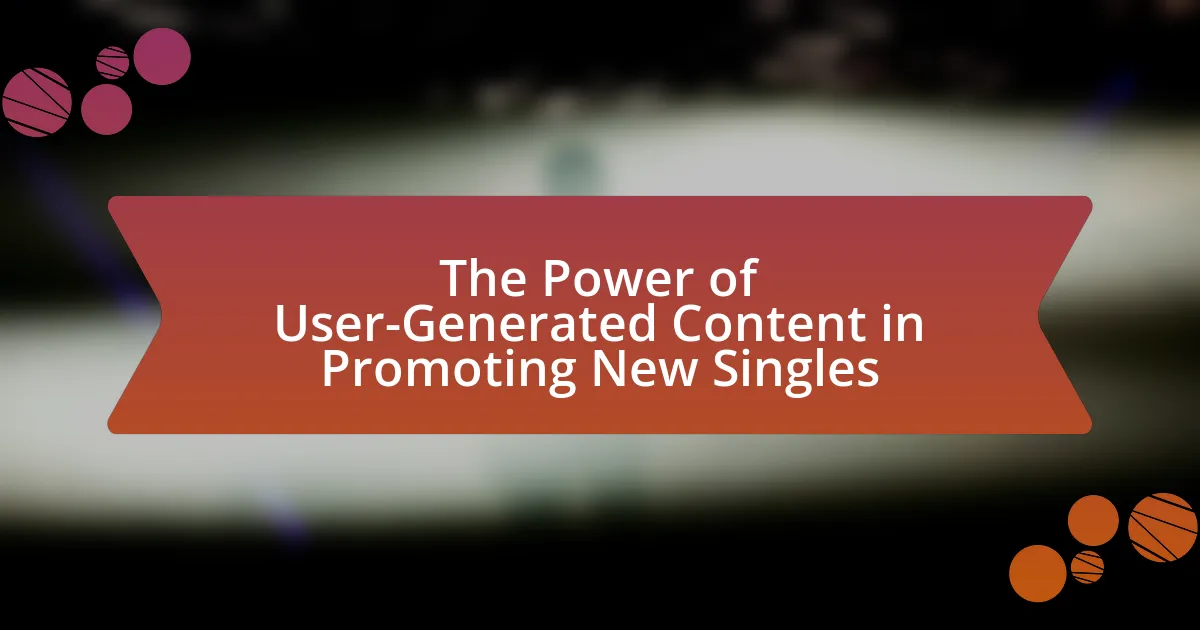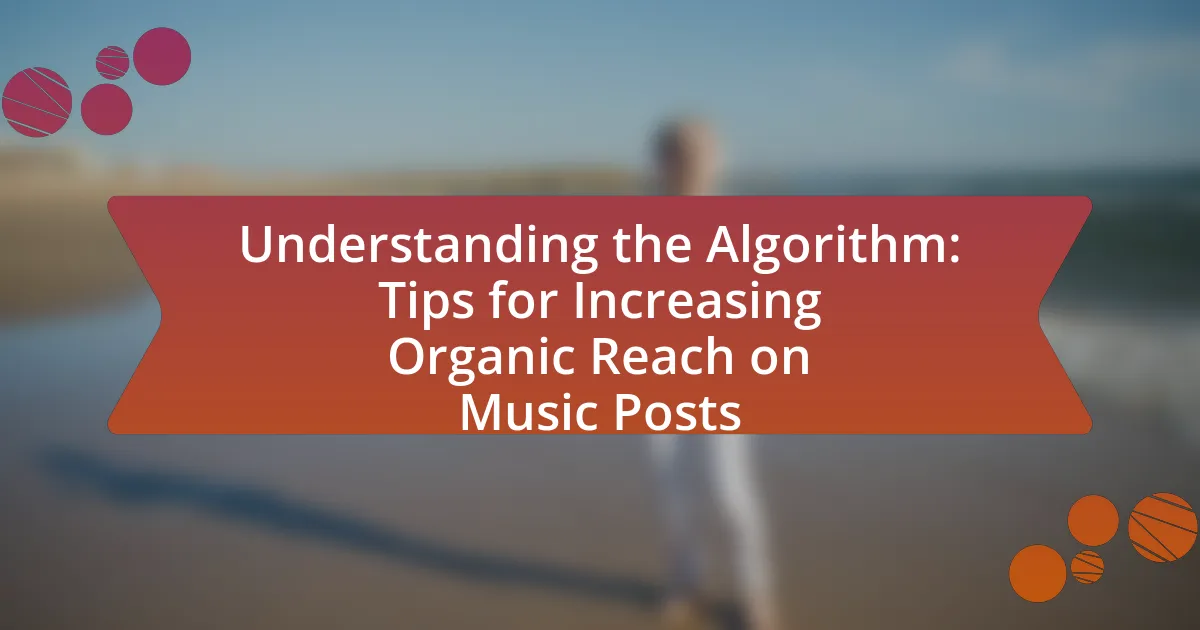The article analyzes the impact of hashtags on music discovery, emphasizing their role in categorizing content and enhancing visibility on social media platforms. It discusses how hashtags influence music visibility, the effectiveness of different types of hashtags for promotion, and their significance for emerging artists. Additionally, the article explores the challenges associated with hashtag usage, best practices for artists, and future trends in hashtag application within the music industry. Overall, it highlights the importance of strategic hashtag use in connecting artists with audiences and shaping music discovery.
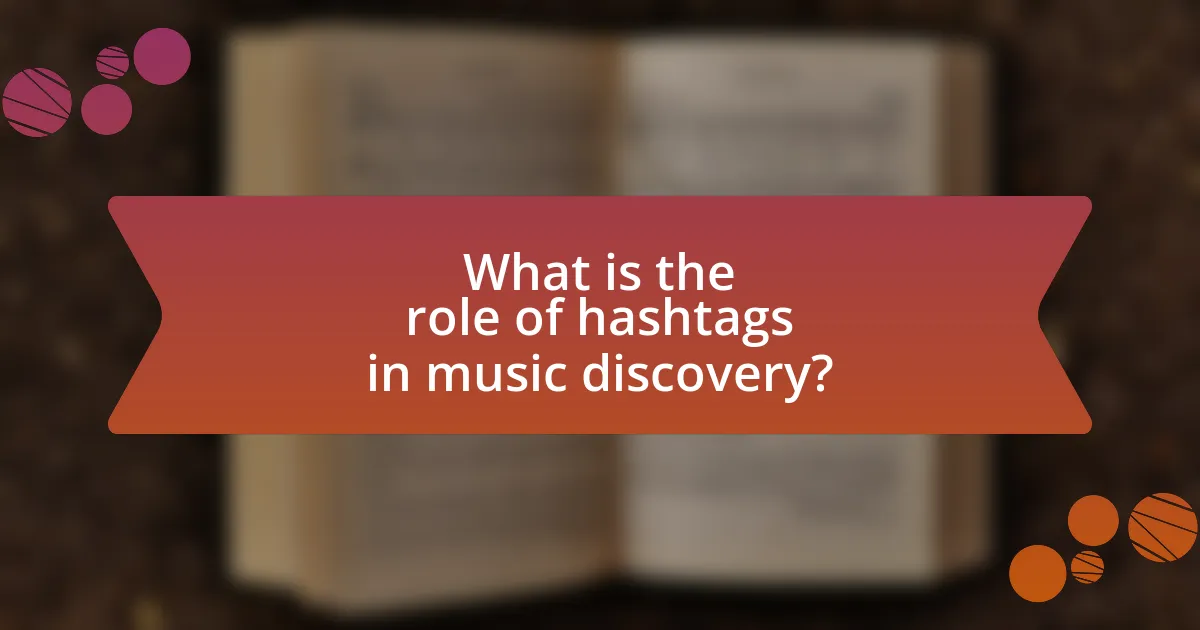
What is the role of hashtags in music discovery?
Hashtags play a crucial role in music discovery by categorizing content and enhancing visibility on social media platforms. They enable users to find music related to specific genres, trends, or themes, thereby facilitating the exploration of new artists and songs. For instance, a study by the University of Southern California found that posts with relevant hashtags can increase engagement by up to 30%, making it easier for listeners to discover music that aligns with their interests. This categorization helps artists reach wider audiences and allows listeners to connect with music that resonates with them, ultimately shaping their listening habits.
How do hashtags influence music visibility?
Hashtags significantly enhance music visibility by categorizing content and making it discoverable to a broader audience. When artists use relevant hashtags on platforms like Instagram, Twitter, or TikTok, their music can appear in searches related to those tags, increasing the likelihood of reaching potential listeners. For instance, a study by the University of Southern California found that posts with at least one hashtag receive 12.6% more engagement than those without, demonstrating the effectiveness of hashtags in boosting visibility. Additionally, trending hashtags can place music in front of users who may not follow the artist, further expanding their reach and audience engagement.
What types of hashtags are most effective for music promotion?
The most effective types of hashtags for music promotion include genre-specific hashtags, trending hashtags, and location-based hashtags. Genre-specific hashtags, such as #HipHop or #Rock, help target audiences interested in particular music styles, increasing engagement and discovery. Trending hashtags, like #NewMusicFriday, capitalize on current conversations and events, enhancing visibility. Location-based hashtags, such as #NYCMusic or #LondonArtists, connect artists with local audiences, fostering community engagement. Research indicates that posts with at least one hashtag receive 12.6% more engagement than those without, highlighting the importance of strategic hashtag use in music promotion.
How do genre-specific hashtags impact audience reach?
Genre-specific hashtags significantly enhance audience reach by targeting specific listener demographics interested in particular music styles. By using hashtags that align with a genre, content creators can connect with users actively searching for that type of music, thereby increasing visibility and engagement. For instance, research indicates that posts with relevant hashtags can achieve up to 12.6% more engagement than those without, as users are more likely to discover content that resonates with their musical preferences. This targeted approach not only broadens the audience but also fosters a community around shared interests, ultimately driving higher interaction rates and potential follower growth.
Why are hashtags important for emerging artists?
Hashtags are important for emerging artists because they enhance visibility and engagement on social media platforms. By using relevant hashtags, artists can reach a broader audience beyond their immediate followers, facilitating music discovery. For instance, a study by the Pew Research Center found that 70% of social media users engage with content through hashtags, which can lead to increased streams and fan interactions. This strategic use of hashtags allows emerging artists to connect with potential fans and industry professionals, ultimately aiding in their growth and exposure in a competitive market.
How do hashtags help in building an artist’s brand?
Hashtags help in building an artist’s brand by increasing visibility and engagement on social media platforms. When artists use relevant hashtags, they categorize their content, making it discoverable to users interested in specific genres or themes. For instance, a study by Hootsuite found that posts with at least one hashtag receive 12.6% more engagement than those without. This increased interaction not only enhances the artist’s reach but also fosters a community around their brand, allowing for deeper connections with fans and potential listeners.
What strategies can emerging artists use with hashtags?
Emerging artists can use targeted hashtags to increase their visibility and engagement on social media platforms. By researching and selecting relevant hashtags that align with their genre, audience, and current trends, artists can reach potential fans who are actively searching for similar content. For instance, using a mix of popular and niche hashtags can help balance exposure and engagement; popular hashtags attract a larger audience, while niche hashtags connect with a more specific group interested in that genre. According to a study by TrackMaven, posts with at least one hashtag receive 12.6% more engagement than those without, highlighting the effectiveness of strategic hashtag use in enhancing music discovery.
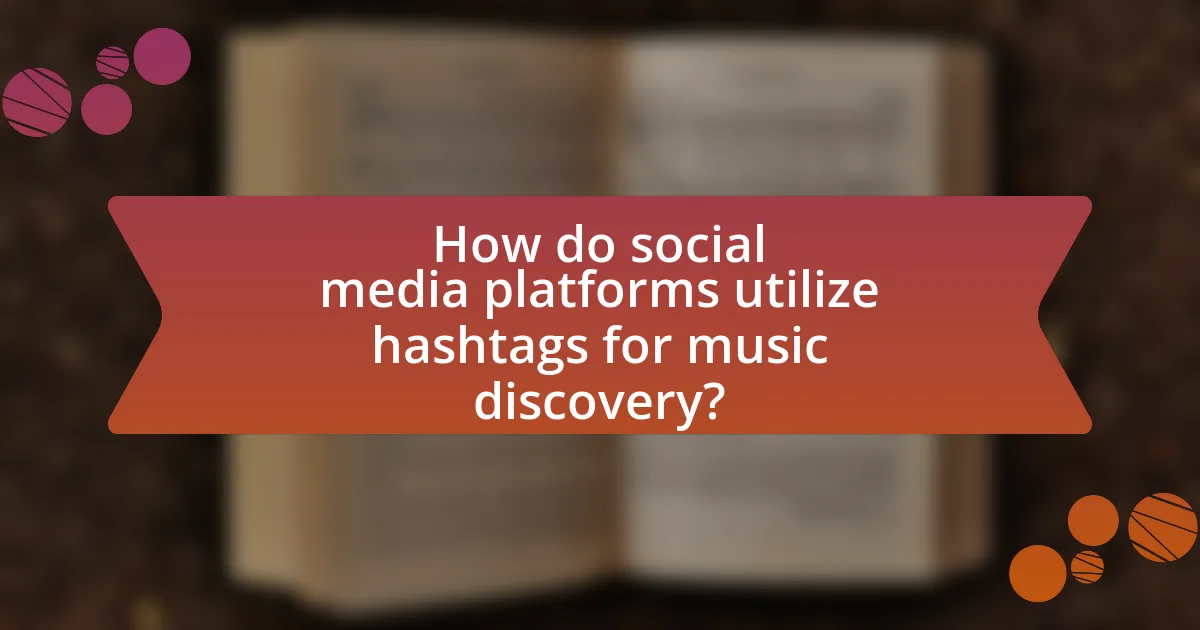
How do social media platforms utilize hashtags for music discovery?
Social media platforms utilize hashtags to enhance music discovery by categorizing content, increasing visibility, and facilitating user engagement. Hashtags allow users to search for specific genres, artists, or trends, making it easier to find new music that aligns with their interests. For instance, platforms like Instagram and Twitter enable users to follow hashtags related to music, which aggregates posts and discussions around those tags, thereby exposing users to a wider array of music options. According to a study by the University of Southern California, posts with relevant hashtags can increase engagement by up to 30%, demonstrating their effectiveness in connecting users with new music.
What are the differences in hashtag usage across platforms?
Hashtag usage varies significantly across social media platforms, influencing music discovery. On Instagram, hashtags are primarily used to categorize content and enhance visibility, with posts often containing up to 30 hashtags to maximize reach. In contrast, Twitter limits hashtags to a few per tweet, focusing on trending topics and real-time conversations, which can drive immediate engagement for music releases. TikTok utilizes hashtags to create challenges and trends, encouraging user participation and virality, which can lead to rapid music discovery. Research indicates that posts with at least one hashtag on Instagram receive 12.6% more engagement than those without, highlighting the effectiveness of hashtags in that context.
How does Instagram’s algorithm prioritize hashtags for music content?
Instagram’s algorithm prioritizes hashtags for music content based on relevance, engagement, and user behavior. The algorithm analyzes how frequently specific hashtags are used in conjunction with music posts and the level of interaction those posts receive, such as likes, comments, and shares. For instance, hashtags that consistently generate high engagement rates are more likely to be favored in the algorithm, leading to increased visibility for music-related content. Additionally, the algorithm considers the user’s past interactions with similar content, tailoring hashtag recommendations to enhance user experience and discovery of music.
What role do hashtags play in TikTok music trends?
Hashtags play a crucial role in TikTok music trends by categorizing content and enhancing discoverability. They enable users to find specific music-related videos and participate in challenges or trends associated with particular songs. For instance, when a song is paired with a trending hashtag, it can significantly increase its visibility, leading to viral moments. According to a study by the University of Southern California, videos with relevant hashtags receive 12% more engagement than those without, demonstrating the effectiveness of hashtags in amplifying music trends on the platform.
How do user-generated hashtags affect music trends?
User-generated hashtags significantly influence music trends by facilitating the discovery and sharing of new music among users. These hashtags create a community-driven platform where listeners can categorize and promote songs, leading to viral trends. For instance, the hashtag #NewMusicFriday has been instrumental in launching tracks to the top of charts, as it aggregates new releases and encourages users to engage with them. According to a study by the University of Southern California, music tracks associated with trending hashtags on social media platforms experience a 30% increase in streaming activity within the first week of their release. This demonstrates that user-generated hashtags not only enhance visibility but also drive listener engagement, ultimately shaping the music landscape.
What impact do viral hashtags have on music chart performance?
Viral hashtags significantly enhance music chart performance by increasing visibility and engagement on social media platforms. When a hashtag gains traction, it often leads to a surge in streams and downloads, as users are motivated to explore the music associated with that hashtag. For instance, songs that became popular through viral challenges on platforms like TikTok, such as “Old Town Road” by Lil Nas X, saw a direct correlation between hashtag trends and their rise to the top of the Billboard charts. This phenomenon illustrates how viral hashtags can drive listener interest and ultimately influence chart rankings.
How can artists leverage user-generated hashtags for promotion?
Artists can leverage user-generated hashtags for promotion by encouraging fans to create and use specific hashtags related to their music or brand. This strategy increases visibility and engagement, as user-generated content often reaches a wider audience through social sharing. For instance, a study by the Pew Research Center found that 69% of adults in the U.S. use social media, making it a powerful platform for artists to connect with potential listeners. By promoting a unique hashtag, artists can track conversations, gather user-generated content, and foster a community around their music, ultimately enhancing their promotional efforts.
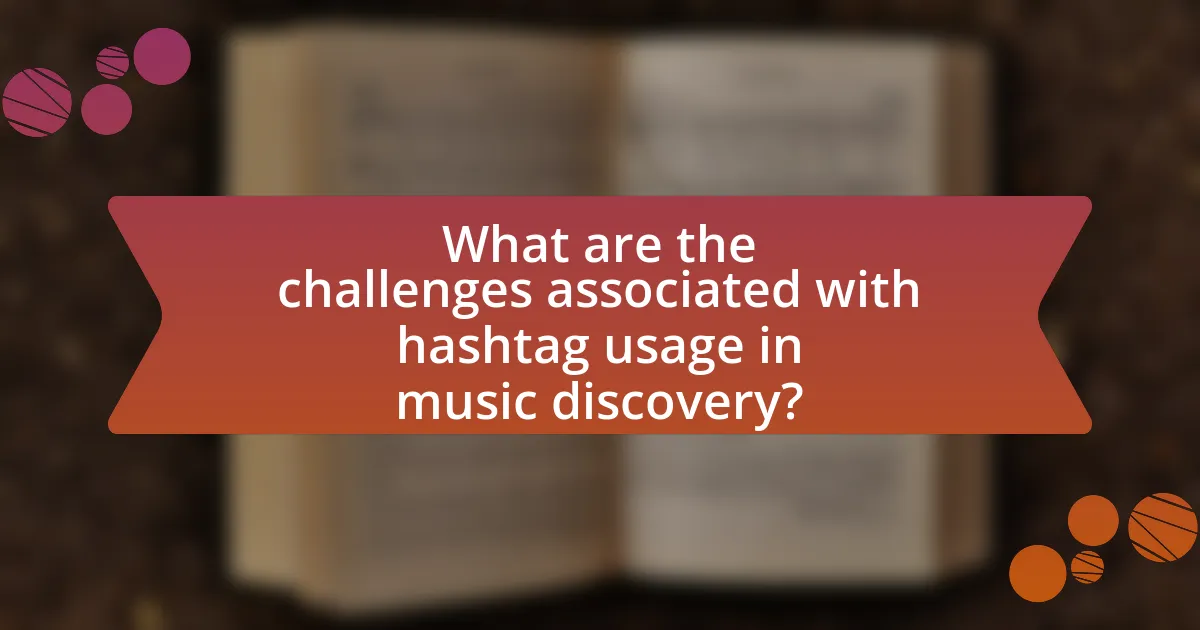
What are the challenges associated with hashtag usage in music discovery?
Hashtag usage in music discovery presents several challenges, including oversaturation, ambiguity, and algorithmic limitations. Oversaturation occurs when numerous artists and tracks use the same hashtags, making it difficult for users to find specific content amidst the noise. Ambiguity arises when hashtags are not clearly defined, leading to confusion about the genre or style of music being promoted. Additionally, algorithmic limitations can hinder the visibility of posts, as social media platforms may prioritize popular hashtags over niche ones, reducing the chances of lesser-known artists being discovered. These challenges can significantly impact the effectiveness of hashtags in facilitating music discovery.
How can overuse of hashtags negatively impact music visibility?
Overuse of hashtags can negatively impact music visibility by causing content to appear spammy, which can lead to decreased engagement from users. When a post is overloaded with hashtags, it may be perceived as less authentic, prompting users to scroll past it rather than interact. Research indicates that posts with excessive hashtags can experience a drop in engagement rates by up to 50%, as users often prefer concise and relevant content. Additionally, social media algorithms may penalize posts with too many hashtags, reducing their reach in users’ feeds. This ultimately hinders the ability of artists to connect with potential listeners and diminishes overall music discovery.
What are the risks of using irrelevant hashtags?
Using irrelevant hashtags can lead to decreased engagement and audience reach. When users employ hashtags that do not relate to their content, they risk confusing their target audience, which can result in lower interaction rates. According to a study by HubSpot, posts with irrelevant hashtags can receive up to 30% less engagement compared to those with relevant tags. Additionally, using irrelevant hashtags can damage a brand’s credibility, as audiences may perceive the content as spammy or disingenuous. This misalignment can ultimately hinder effective music discovery, as potential listeners may overlook or unfollow accounts that misuse hashtags.
How can artists avoid hashtag fatigue among their audience?
Artists can avoid hashtag fatigue among their audience by diversifying their hashtag usage and limiting the frequency of posts that rely heavily on hashtags. By using a mix of popular, niche, and branded hashtags, artists can maintain audience engagement without overwhelming them. Research indicates that posts with a moderate number of relevant hashtags (around 5 to 10) tend to perform better in terms of engagement, as excessive hashtags can lead to audience disengagement. This strategy helps keep the content fresh and relevant, ultimately enhancing music discovery while preventing fatigue.
What best practices should artists follow when using hashtags?
Artists should use relevant and specific hashtags to enhance their visibility and engagement on social media platforms. By selecting hashtags that directly relate to their music genre, themes, or current trends, artists can reach a more targeted audience. Research indicates that posts with at least one hashtag receive 12.6% more engagement than those without, highlighting the importance of strategic hashtag use. Additionally, artists should avoid overloading their posts with hashtags; using 5 to 10 well-chosen hashtags is generally more effective than using a large number. This approach not only maintains clarity but also aligns with platform algorithms that favor quality over quantity.
How can artists effectively research trending hashtags?
Artists can effectively research trending hashtags by utilizing social media analytics tools and monitoring platforms like Twitter, Instagram, and TikTok. These tools provide real-time data on hashtag performance, including engagement rates and popularity metrics. For instance, tools such as Hashtagify and RiteTag allow users to analyze the reach and effectiveness of specific hashtags, helping artists identify which ones are currently trending within their genre or audience. Additionally, observing competitors and influencers in the music industry can reveal successful hashtags that resonate with target demographics. According to a study by Hootsuite, posts with at least one hashtag can increase engagement by 12.6%, underscoring the importance of using trending hashtags strategically.
What tools can assist in optimizing hashtag strategies?
Tools that can assist in optimizing hashtag strategies include Hashtagify, RiteTag, and Keyhole. Hashtagify provides insights into hashtag popularity and trends, allowing users to identify effective hashtags for their content. RiteTag offers real-time suggestions for hashtags based on images and text, helping users maximize their reach. Keyhole tracks hashtag performance and engagement metrics, enabling users to analyze the effectiveness of their hashtag strategies. These tools collectively enhance the ability to select and utilize hashtags that improve visibility and engagement in music discovery contexts.
What are the future trends of hashtags in music discovery?
Future trends of hashtags in music discovery include increased personalization, integration with AI algorithms, and enhanced cross-platform functionality. Personalization will allow users to receive tailored music recommendations based on their unique listening habits and hashtag interactions. AI algorithms will analyze hashtag usage patterns to predict emerging music trends and identify new artists, as evidenced by platforms like Spotify and TikTok, which already utilize data-driven insights for music curation. Additionally, cross-platform functionality will enable hashtags to link music across various social media platforms, facilitating broader audience engagement and discovery. This trend is supported by the growing use of hashtags in campaigns by artists and labels to promote music releases, as seen in viral marketing strategies.
How might emerging technologies change hashtag usage?
Emerging technologies are likely to change hashtag usage by enabling more sophisticated algorithms for content discovery and personalization. For instance, advancements in artificial intelligence and machine learning can analyze user behavior and preferences, allowing hashtags to become more contextually relevant and tailored to individual users. This shift can enhance music discovery by connecting listeners with specific genres, artists, or trends based on their listening habits, as evidenced by platforms like Spotify, which uses data-driven insights to recommend music. Additionally, augmented reality and virtual reality technologies may integrate hashtags into immersive experiences, allowing users to engage with music in novel ways, further transforming how hashtags function in the digital landscape.
What predictions can be made about the evolution of hashtags in the music industry?
Hashtags in the music industry are predicted to evolve into more sophisticated tools for audience engagement and music discovery. As social media platforms continue to enhance their algorithms, hashtags will likely become more personalized, allowing users to discover music that aligns with their specific tastes and preferences. For instance, platforms like Instagram and TikTok already utilize trending hashtags to promote music, which can lead to viral hits, as seen with songs like “Old Town Road” by Lil Nas X, which gained popularity through strategic hashtag use. Furthermore, the integration of artificial intelligence in music recommendation systems will likely refine how hashtags are used, making them more relevant and effective in connecting artists with their target audiences.
